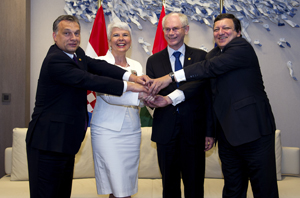European Commissioner for Regional Policy Johannes Hahn, welcomed two developments that demonstrate the progress being made in the EU’s policy for Macro-Regional Strategies. Positive outcomes on the ground are evident in the new progress report on the implementation of the EU Strategy for the Baltic Sea Region, the first of its kind, launched in 2009.
Infact, on the 23rd of June the Heads of State and Government gave their endorsement to the EU Strategy for the Danube Region, adopted by the Commission last December.
Some 15 Member States benefit from these new cooperative approaches. The political commitment of stakeholders at all levels is vital to the success of both strategies.
Commissioner Hahn stated: “I am delighted that in the Baltic Sea Region we can already see that the macro-regional approach is bearing fruit. The first progress report shows that partners in the region are already seizing the opportunities to work together in new ways, – to the benefit of the people who live there”
He added, “I am delighted that the EU Strategy for the Danube Region is now officially launched. Many actors are already hard at work preparing for implementation of the strategy. Now they can really get down to the business of turning plans into action”.
Both strategies are based on a “macro-regional†approach. It brings countries together to cooperate on setting goals, aligning funding, and working together on shared challenges such as sea or river pollution, the need for better transport links, or more secure energy provisions.
EU Strategy for the Baltic Sea Region
Since its launch in 2009, the 8 Member States involved in the EU Strategy for the Baltic Sea Region, and their non-Member States partners have developed new ways of co-operating more deeply to tackle questions like water quality in the Baltic Sea, the need to promote innovation in the region and a host of other issues. The new progress report prepares a review of the strategy foreseen under the Polish Presidency. It is the result of a wide consultation of all stakeholders and provides an assessment of current implementation.
The Report highlights progress such as:
•Baltic Deal which works with farmers across the Region to reduce nutrient run-off, and therefore eutrophication
•Baltic Transport Outlook which provides structured planning support for transport infrastructure in the Region, based on comprehensive analyses of flows of goods and passengers
•The integration of the three Baltic States into the European energy market. It is being achieved by the Baltic Energy Market Interconnection Plan, based on the macro-regional energy priorities identified by the Strategy
•The BaltFish Forum aims to develop a new, more regional, approach to fisheries management
The Report shows that the Strategy facilitates new projects and it gives momentum to existing ones. But the Strategy is not solely focussed on projects; its integrated approach encourages better policy development and the alignment of funding and resources, resulting in a better implementation of the EU’s overall objectives under Europe2020.
The report makes recommendations including:
•Regular discussions of the Strategy by ministers in Council meetings
•Set targets to prioritise the Strategy’s work
•Maximise efforts to align Structural Funds and other funding sources to the objectives of the Strategy
The EU Strategy for the Danube Region
The European Council’s endorsement of the EU Strategy for the Danube Region today has come six months after the Commission’s adoption of the proposal in December 2010. Implementation can now begin. Some 200 priority actions will contribute to developing the area’s economic potential and improving environmental conditions.
The strategy focuses on four main pillars:
•Connecting the Danube Region: improving mobility, encouraging sustainable energy and promoting culture and tourism;
•Protecting the environment in the Danube Region: restoring water quality, managing environmental risks and preserving biodiversity;
•Building prosperity in the Danube Region (developing research capacity, education and information technologies, supporting the competitiveness of enterprises and investing in people’s skills;
•Strengthening the Danube Region (stepping up institutional capacity and improving cooperation to tackle organised crime).
The Commission will also monitor the implementation progress of this strategy, as with that of the Baltic Sea Region, and will publish a first report at the end of 2012.




